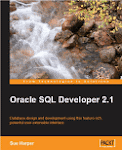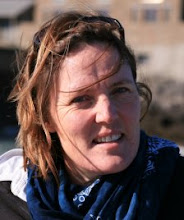I think the whole of 2008 is conference season! It's starting to feel like it. I think I don't travel much, certainly I know that Oracle Sales Consultants seems to be on the road permanently and I know some of the Oracle Server Tech PMs are really busy on the road. I tend to be desk based, well, that's how I see myself. So here's how a desk-based PM spends her time.
I'm at HQ this week - nice spot - lovely weather, although deceptively cold. I say that because the sky is the same colour as it was last week and the hotel room temperature is the same as last week, but it all changes when I step outside. Where I was last week might explain why I feel that. Last week was
ODTUG in New Orleans!
Great event. Lots of very enthusiastic and experienced developers. Most willing to learn new technologies and excited and positive about the future.
As ever the conference supported 50% new attendees. Each year it does (as so most conferences) and each year we are surprised. "[shocked and amazed] You mean half of these folk have never been before? Where are the oldies?" Anyway, there were enough of "the oldies" about and that's great. Although sometimes I wonder what it feels like for the new folk, as there is something of a family feel about the place as folk catch up on news since last everyone met and lots of name dropping in the various talks as if everyone knows everyone else. I guess most do.
I did 2 talks. One I call my "drill down" talk, where I assume you use the tool or a similar one, and show some of the more in depth things you can do. Typically, I pick 4 features and spend about 15 mins on each topic. My personal favorite is the XML extensibility, which we can all do. No need for Java skills to extend some aspects of SQL Developer and certainly a nifty aspect to the tool. (Most DBAs I know have a collection of utilities or tasks they regularly perform). If you have no idea what I am talking about, search this blog or the OTN pages, there is a tutorial on the SQL Developer pages on just that feature.
My other talk is the SQL Developer overview and as someone pointed out, now requires more than an hour. Next time I'll skip the intro completely. I did a few positioning slides and then dived into a 50 minute demo. By all accounts - well received.
That an hour is a little short is easily illustrated - I was in Denmark a few weeks back, where I spent the day with a group of DBAs and developers, each armed with their laptops, and together we walked our way through SQL Developer, from the APEX support to the Migration, through XML extensions and reporting. It was a great day.
NewsWe were excited to bring some news of the next release of SQL Developer to ODTUG. You might have seen this in the "twittersphere", on other blogs, or have stumbled across our latest
Statement of Direction. The plan is to incorporate data modeling in SQL Developer. This is a much requested feature in a tool already being used by many database developers and architects. We'll publish an FAQ on OTN in due course to address queries about this.
More ConferencesAs I submitted abstracts to events and then registered for these events, I've meant to let you know of their existence, but did not get to it. So ODTUG is over for 2008, but I'll remind you now that it'll be there next year and that they'll probably be asking for abstracts in November-ish, so diarise that!
There are quite a few events that you have not missed yet, like
Oracle OpenWorld coming up in September. Details of talks are already available and what's great is that the "Develop" part of the event is at the Marriott, so not blocks away from the main event. Easy access between talks and hands on sessions. SQL Developer has 4 different hands on sessions, and 4 different talks, not to mention the demopods, where you can meet the developers and ask questions.
I've submitted abstracts to DOAG (in Germany), Israel, UKOUG (Birmingham) and Scotland (Glasgow) and will be submitting to the New York user group. So if you missed the chance to hear more about SQL Developer, there should be something near you. You'll note there is nothing in APAC and regrettably I can't get to AUSOUG.
Let me know if there is a conference near you. I can add that kind of news to the
SQL Developer Exchange News page and keep everyone up-to-date.






